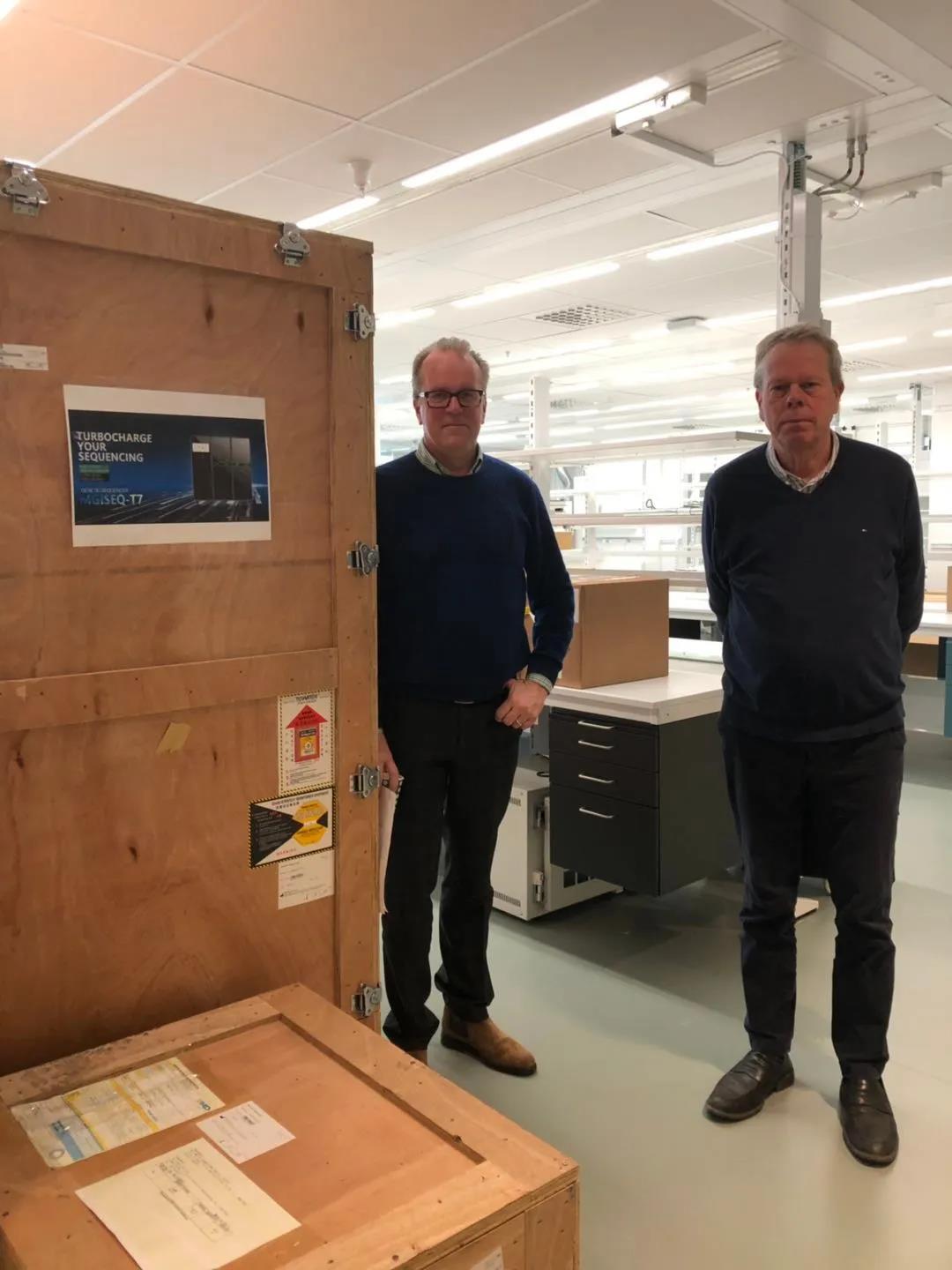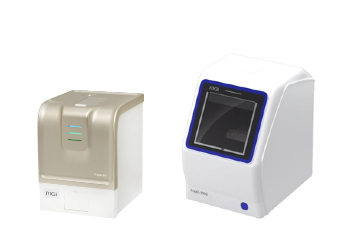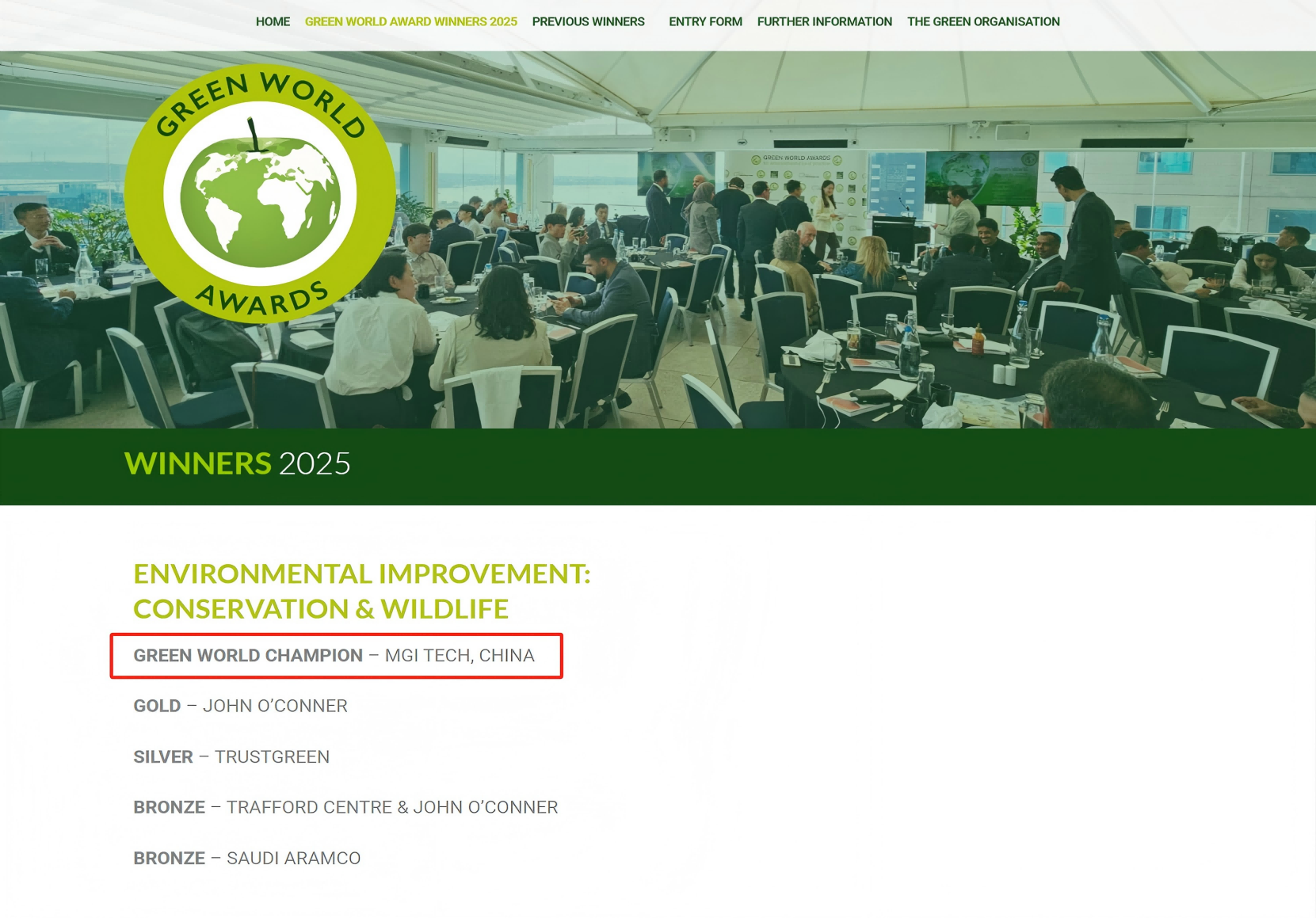STOCKHOLM, Sweden and SHENZHEN, China, March 25, 2020- The Swedish Karolinska Institutet (KI) and MGI announced they will jointly build a multi-omics testing laboratory for the detection of novel coronavirus in the Swedish capital Stockholm. The laboratory has two purposes of virus detection and scientific research. It integrates three methods of detection, namely qPCR, high-throughput sequencing, and antibodies. It is equipped with high-throughput sequencer and automated sample preparation system to achieve a testing capacity of 10,000 samples daily and comprehensive and multi-omics monitoring of viral mutations. This cooperation was jointly promoted by MGI and the Swedish National Infrastructure Science for Life Laboratory (SciLifeLab).

Prof. Lars Engstrand (left), Prof. Mathias Uhlen (right) and DNBSEQ-T7
"Huo-Yan" Lab goes global with MGI’s equipment as the core
The cooperation between MGI and the Karolinska Institutet of Sweden focuses on platform construction, improvement of detection throughput, and development and research of novel coronavirus detection technology. In order to successfully achieve the target of 10,000 to 20,000 nucleic acid detection samples per day, MGI will provide the laboratory with independently developed high-throughput automated viral nucleic acid extraction device MGISP-960 to reduce manual operation procedures, increase the speed of large-scale sample detection, and gain valuable time to fight the epidemic.
At the same time, in order to decode the genome sequence of the new coronavirus, study and analyze the evolutionary sources and pathological mechanisms of the new coronavirus, and monitor the mutation of the virus at a large population level, MGI will provide the laboratory with the new coronavirus detection kits and the DNBSEQ-T7 sequencing system that has been approved by the China National Medical Products Administration (NMPA) and granted with CE certification. Professor Mathias Uhlen, the leader of the Human Protein Mapping Program and an academician of the Royal Swedish Academy of Engineering, will use this to urgently develop a multi-omics technology for large-scale population screening.
Previously, MGI's high, middle, and low throughput sequencers have been used by disease control centers and scientific research institutions across the country to complete the testing of thousands of samples on the frontline of the epidemic. To ensure that the Swedish "Huo-Yan" laboratory be able to start before March 30, MGI also sent a technical team to the laboratory for equipment installation and training operation guidance.
“This is an important step in increasing capacity and ensuring quick and safe testing. In addition to our own staff, numerous individuals with relevant laboratory experience have volunteered to make this happen,” said Lars Engstrand, Professor of Infectious Diseases and director of KI's and SciLifeLab’s Center for Translational Microbiome Research (CTMR).“ All support and all initiatives are important right now, both those that address more immediate issues and those that both now and in the future increase our understanding of the new coronavirus. We have now secured the capacity to carry out a large number of analyses,” he added.
The laboratory in Sweden has the strong support of the local community and reflects the vision of a shared future for people around the world and the friendship between the different countries in the face of the pandemic. The Wallenberg Foundation, Sweden's largest scientific research funding provider, has pledged it will fully support KI as the core force of Sweden's national novel coronavirus screening and support the preparation for the lab of KI and MGI. In addition, Sweden's Gothenburg and Lund regions will send technical personnel to support the construction of the novel coronavirus multi-omics laboratory to achieve the its 24-7 operation and daily throughput of 10,000 samples.
Dr. Hou Yong, Head of MGI EU&AF Region, said: "The epidemic spread has no borders. Countries around the world are a community of common interests. MGI is very willing to work with European partners to jointly develop and build a standardized integrated laboratory system for the detection and monitoring of the novel coronavirus with a multi-omics detection system and a high-throughput sequencing system. MGI will promote and share China's successful experience in building the “Huo-Yan”Lab. We also hope that MGI's equipment can provide timely support in gene sequencing and automated sample preparation. "
The development of the "Huo-Yan" Lab in Sweden as a 10,000-level novel coronavirus multi-omics testing laboratory is an important step for China's " Huo-Yan " experience to go global. It also symbolizes MGI going global and playing vital role.



 Sequencer Products: SEQ ALL
Sequencer Products: SEQ ALL















 Technologies
Technologies Applications
Applications Online Resources
Online Resources Data Bulletins
Data Bulletins Service & Support
Service & Support Introduction
Introduction Newsroom
Newsroom Doing Business With Us
Doing Business With Us Creative Club
Creative Club













